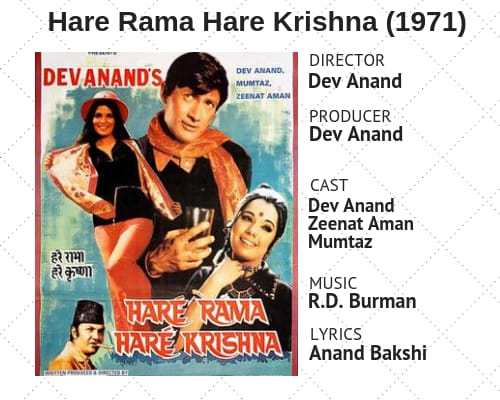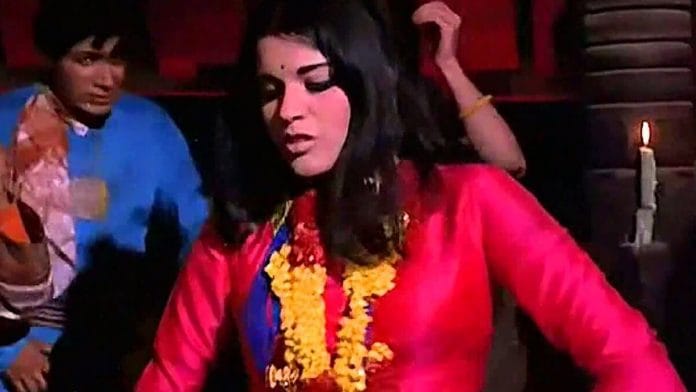Dev Anand’s film Hare Rama Hare Krishna, starring Zeenat Aman, gave India both its Rakhi and hippie anthem.
India has always been deeply conflicted about its relationship with Western ideas. People, like their governments, keep looking more to the past than the future. Nearly 47 years ago, actor-filmmaker Dev Anand had a similar predicament about the prevalent hippie culture at the time in India. And he made a deeply conservative movie — Hare Rama Hare Krishna (1971) — about it. But ironically, he ended up giving Hindi cinema its ‘boldest’ lead actress till date.
 Zeenat Aman, who did Hare Rama Hare Krishna in the same year she made her debut, turned 66 this week. In her unconventional career, she acted in a number of films portraying characters that her contemporaries considered too risky. This one, her breakout success, remains the most novel.
Zeenat Aman, who did Hare Rama Hare Krishna in the same year she made her debut, turned 66 this week. In her unconventional career, she acted in a number of films portraying characters that her contemporaries considered too risky. This one, her breakout success, remains the most novel.
In the late 1960s, as the hippie culture grew out of the US and spread across the world, including India, it drew extensive retaliation from traditional societies. As a counter-culture, it forced people the world over to review their ways of living. But it also drew too many young people out of their safe zones and engulfed a lot of them, especially through drugs.
Also read: Top scientists say this is why India should try and legalise marijuana in 2 years
Anand focused on this particular aspect in Hare Rama Hare Krishna, which was plotted over the relationship between siblings, Prashant ( Dev Anand) and Jasbir (Zeenat Aman).
Born to Montreal-based Jaiswal family, the sibling bond is effortlessly shown through the song ‘Phoolon Ka Taaron Ka’, a Raksha Bandhan anthem even today.
As the Jaiswal family disintegrates over an affair of the patriarch, the children get separated. Prashant moves with his mother to India, in a secure environment, while Jasbir remains with her father, in an atmosphere that pushes her towards emotional isolation. This thrusts her into the hippie culture as she grows up.
Prashant, now a pilot played by Anand, receives a letter from his father that his sister is in Kathmandu, and living with the hippies. Like a good sanskari elder brother, he goes to Nepal to look for his beloved sister Jasbir, only to find a weed-smoking, troubled hippie Janice, played by Zeenat Aman.
Also read: Zeenat Aman, diva who dared Bollywood conventions on screen but believed in them off it
The Jasbir-Janice transformation was a classic Bollywood metaphor for cultural erosion. Just a year before Hare Rama Hare Krishna, another popular movie called Purab Aur Paschim had hypnotised Indian audiences with a similar virtuous India vs decadent West binary.
Angry with the world and herself, Janice now seeks solace in the hippie cult and drug-filled bliss, where people wear T-shirts saying ‘Free Love’. She poses a powerful question about generational angst in the title song: ‘Duniya ne humko diya kya, duniya ne hamse liya kya, hum sab ki parwa karen kyun? (What did the world ever give us, what did the world take away from us, why should we care?)’
The film then unfolds through a maze of drugs, crime and religion.
Through the story (and songs), Anand asks the ‘wayward’ youth to not ruin the name of Ram as they sing Hare Rama Hare Krishna. He urges them to wake up and not run from life, towards drugs and other vices.
His almost monosyllabic, paranoid take on both the counter-culture and religious iconography may have had something to do with the fact that he made Hare Rama Hare Krishna after the commercial failure of his debut directorial Prem Pujari (1970).
But he had enough drama going on in the film to keep audiences hooked. The most compelling of all characters was, obviously, Janice/Jasbir, certainly because someone like her had not been too commonly seen on Indian screens. At a time when actresses were either gold-hearted or vamps, Janice was a refreshing change. It’s difficult to think of too many women characters before Janice that asked the audience to ‘Dum Maro Dum’ (Smoke up).
The R.D. Burman soundtrack, one of his most popular ones, is memorable for more reasons than one. If Asha Bhosle won everyone and everything for ‘Dum Maro Dum’, the title song also introduced listeners to a unique voice – Usha Uthup, even though she had debuted earlier.
Also read: Lessons in stardom from Dev Anand
Anand was eminently watchable, depending on where you stand on his oeuvre. Aman too created her own space and owned it for at least a decade to come. Although, the other lead, Mumtaz, didn’t have much to do.
Zeenat Aman was Bollywood’s tryst with Westernised modernity. In the process, she also got boxed in roles that fitted this persona.
Nearly five decades later, India may not be too bothered about the hippies, but it still shares the movie’s fear of the new and of a cultural takeover. In fact, making a film today with the words Ram and Krishna might itself become a death warrant for the director.







What was the purpose of this article and why should anyone fund such a medium ?
It’s true 100 years old Hindi movie Bollywood had still no so Devanand was or is, The stylish,loved himself & his image so much.He was fully in self love. The charm,the freshness,the dialogue delivery, his chocolate shirts,Collar style,the movement S of hands he never himself felt it odd.Even his admirer never complained about his odd dressing and hairstyles. The impact he created is ever lasting.Never thought or looked back.He was only one .
Dev Anand would have been a frustrated soul today. All his films would have faced mud slinging and organisational censorship along with political interference. Name and filming would have raised questions. Even the topic would have been under scrutiny. And we, the audience, would have missed out on a cult film and good music
Two pretty ladies who could not carry off a saree if their lives depended on it were Zeenat Aman and Parveen Babi.
Two great contributions of this film: (1) Zeenat Aman की बेहतरीन ख़ूबसूरती (though she occasionally flirted with good acting as well); and (2) Usha Uthup की लाजवाब आवाज़ (and she never fails to entertain even today).